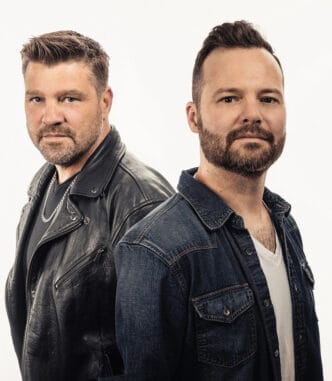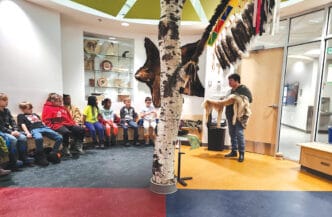City of Lloydminster manager of social programs and services, Patrick Lancaster, addresses the the attendees during the wrap-up portion of the housing needs conference on Jan. 30. Jeannette Benoit-Leipert Meridian Source
The City of Lloydminster held a meeting to discuss what it will take to fulfill housing needs in the community, with a survey now underway.
The City of Lloydminster Housing Needs Assessment and Strategy Community Conference was held at the Lloyd Ex on Jan. 30, with nearly 100 registered attendees participating in the day-long conference.
“One of the things we’ve been hearing from folks is that it was a really great opportunity to connect with other people who are involved in housing in Lloydminster. From a business, but also from a social services provider perspective, to start building some of those relationships,” said Patrick Lancaster, the City’s manager of social programs and services.
The day began with a presentation by Bassa Social Innovations, a consultant team that’s been conducting workshops with various groups in Lloyd for the past seven months to gather information and present an initial report. Lancaster said the validation of their findings was an important part of the process.
“The main presentation was a presentation of the initial findings of the report. A big part of that was the validation process. It was like ‘here’s what we learned—does it feel like Lloydminster? Does this make sense about our community?’
“Our consultants are very conscious of the thought they want to make sure the report represents our community, so they need to hear that from us, as residents.”
Some of the residents who attended the event were seniors, who recorded their findings to share at Tuesday’s Lloydminster Concerned Citizens for Seniors Care Society meeting.
“Any expectation that something super definitive was going to come out of it was a little misplaced, but it was a good discussion, I thought,” said Darrell Dunn, who is currently running for City Council.
“Let’s look at homelessness for a second, there was probably six to eight groups and organizations and contacts that were there, that if they can coalesce there’s some good stuff happening that can be leveraged up into some multi-party, potential solutions.”
Another important part of the day were the breakout group discussions.
“We had some speakers and kind of a fireside-style chat presentation and then following the sessions, breakouts into little working groups to start capturing some ideas,” said Lancaster.
“There’s already lots of great strategies out there, but we wanted to gather some information on what ones would be appropriate locally.”
Sharon Pryor was also in attendance at the housing conference and brought in her voice into the discussion on behalf of Lloydminster seniors.
“I was very glad that I stayed to the end … the last group I got to, of the three groups I attended, I mentioned the senior housing to two of them and the last one they actually said ‘Oh. We hadn’t thought about that, can you talk to us about that?,’” Pryor explained.
“And I did talk to them about it and they actually wrote something down to put on the wall. So I was glad we got someone to acknowledge that at least.”
At the very end of the day, everyone was invited to say a few words in the wrap-up discussion.
“We did hear from some folks, as part of the wrap-up, that they really want to see some action moving forward,” said Lancaster.
“There was sort of an enthusiasm in the idea that, you know what Lloydminster might have all the pieces that we need to really deal with housing for everyone in an effective way.”
Following the conference, there was a survey presented to those in attendance.
“Preliminary results on our survey here, I’m seeing that for the most part people are agreeing that they came away with a better knowledge of housing support systems, they had better knowledge of housing supply in the community,” said Lancaster.
“Some of the comments that we’re hearing back is that people didn’t realize that housing needs were as complex as the are in the community. Or the idea about the continuum of housing, about how every little piece along there affects the next part.”
Dunn said he came away with the feeling that there was some relevant discussion had, that could lead to change.
“There was a lot of different opinions and a lot of input. So, the trick to those kinds of things is don’t expect a whole lot at the end of that particular day, but there’s a lot of seed-planting that goes on and it may well be that some stuff will happen afterwards,” said Dunn.
















